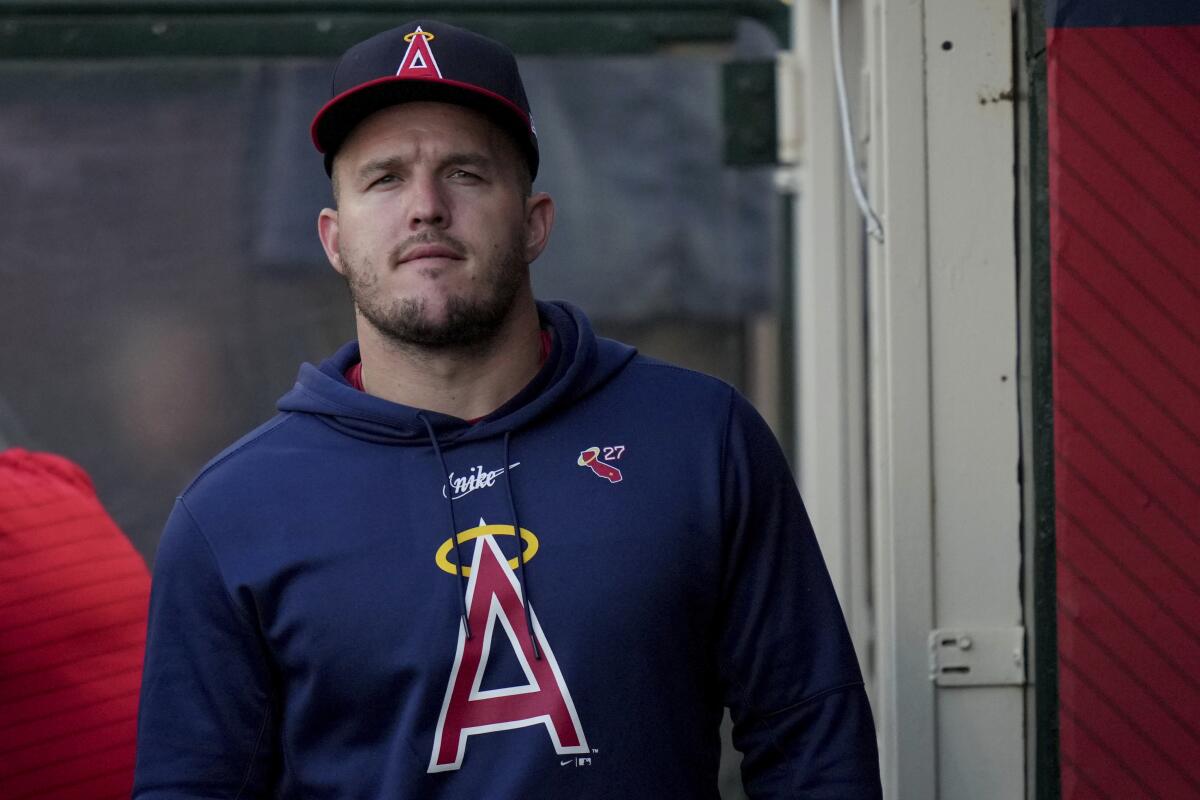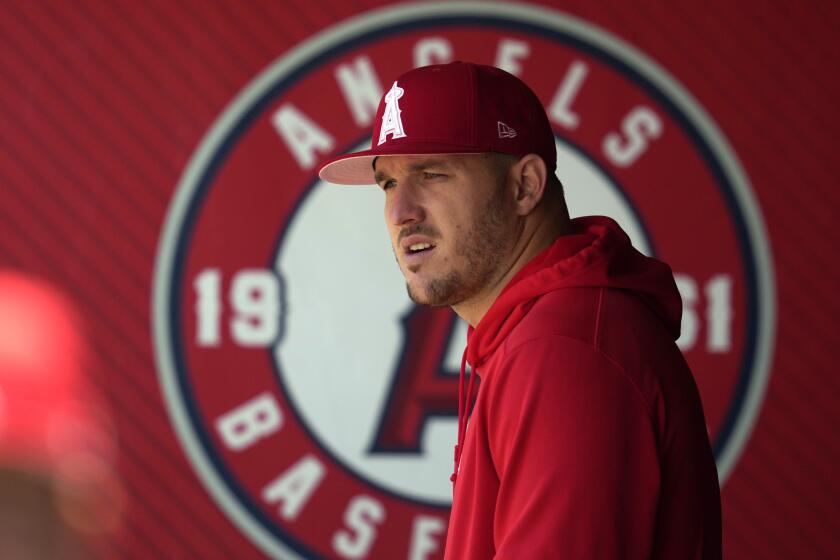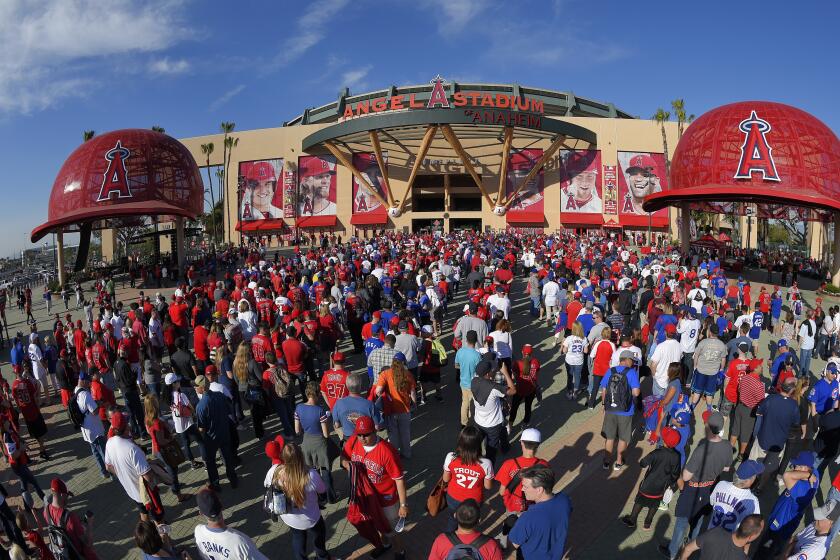How might another lost season for Mike Trout impact his Hall of Fame candidacy?

- Share via
It was Hall of Fame induction weekend a couple of weeks ago, and The Times’ Hall of Fame baseball writer reached out with a provocative question.
“Is Mike Trout still an automatic Hall of Famer?” Ross Newhan asked me.
Five years ago, you would have nodded so fast you might have resembled a bobblehead doll. On Thursday, when the Angels announced Trout would finish the season on the injured list because of a second meniscus tear in his left knee, you at least had to wonder.
Trout played 29 games this season. He has not played even 120 games since 2019. Over the last four seasons, he has missed more games than he has played. His number of games played in the second half: zero, 40, one, zero.
He has six years left on his contract, raising the prospect of his decorated career ending with a decade of injury-shortened seasons.
If the Hall of Fame is all about putting up the numbers, what might Trout’s numbers look like when his career is done?
I asked Dan Szymborski at Fangraphs to run projections for the rest of Trout’s career. The result: Trout is not projected to play 100 games or hit 20 home runs in a season ever again, and he is not projected as an above-average hitter beyond 2028.
Trout turns 33 next week. He is still an effective hitter when he plays so, if he can play more than his recent history would indicate, he can outdo the projections.
This impacts the Angels, of course, because Trout may not be the star of their next good team. If they can develop young anchors beyond shortstop Zach Neto and catcher Logan O’Hoppe over the next two years, then they can emerge as a contender by spending on free agents after the 2026 season, when third baseman Anthony Rendon’s contract runs out. Trout still could be a valuable player then, if not the marquee one.
However, for Hall of Fame purposes, this impacts Trout.
If Trout had stayed healthy and productive at the pace of his elite years of 2012-19, then by the time his contract expired, he would have 3,000 hits and 647 home runs. The latter number would have placed him seventh on the all-time list, just behind Willie Mays.
According to Szymborski’s projections, Trout would finish with 445 home runs and 2,012 hits — and that includes two seasons beyond the expiration of his contract.
Szymborski did not believe the end of Trout’s career would have any impact on his selection to the Hall of Fame.
“He already passed the bus test for me years ago,” Szymborski said.
Bus test?
“Would you vote for this player if he were hit by a bus tomorrow?” he explained.
Jay Jaffe, whose “Cooperstown Casebook” is part of his expertise in the Hall of Fame voting process, said he did not envision the second decade of Trout’s career keeping him out of Cooperstown.
“I can’t really imagine looking at what’s happened to him over the past several years and judging him so harshly that he would be deprived,” Jaffe said. “I could see him not being a unanimous selection or not being a 99.9% selection — maybe a 95% selection, because there are always some who think they should withhold their blessing, just as they do for anybody this side of Derek Jeter.
“But I don’t think it’s going to be a real obstacle to his selection.”
Injured Angels star Mike Trout isn’t sure exactly when he’ll return, but he would be disappointed if he wasn’t playing by the end of July.
Trout is a three-time most valuable player (and Shohei Ohtani could become a three-time MVP this season). The only player to win more MVP awards: Barry Bonds, with seven.
Jaffe suggested Ken Griffey Jr. as a player comparable to Trout: dominant in his 20s, solid but often unavailable in his 30s. Griffey was elected to the Hall of Fame with 99.3% of the vote, a percentage bettered only by Jeter and Mariano Rivera.
“His attendance was sporadic in his 30s,” Jaffe said of Griffey, “but everything he did in his 20s really got him in that position.”
Griffey, who retired at 40, finished with 83.8 wins above replacement, making him one of the top 60 players in major league history by that metric. Trout already has 86.1 WAR, putting him in the top 50.
The only players above him not in the Hall of Fame: Bonds, Roger Clemens and Alex Rodriguez, all associated with steroids, and Albert Pujols, who is not yet eligible.
For old-school voters, so-called counting stats mattered most. Did you hit 500 home runs? Did you collect 3,000 hits?
For a new generation of voters, WAR is the most influential measuring stick. Jaffe said recent electees such as Todd Helton, Scott Rolen and Larry Walker had benefited from that trend.
“WAR really carried the day for them,” Jaffe said. “I think you could look at them and see the path for Trout is pretty clear.”
I circled back to Newhan, who was voted into Cooperstown 24 years ago, so I could ask him the question he had posed: Is Trout an automatic Hall of Famer?
“For a number of years, you would have said, ‘He is definitely young, but he is in the Hall of Fame,’” Newhan said. “I’m not so sure any more.
“He had some good years in there, on top of his great years. But the last few have been so disjointed. I just question, in my own mind, whether I would vote for him today.”
Six more years like the past four, and that could reinforce Newhan’s point. But players become eligible for the Hall of Fame ballot five years after their retirement, so the undecided would have until at least 2035 to think about this.
Sandy Koufax parlayed five magic summers into a plaque at Cooperstown. Trout had eight of those magic summers.
You may say, well, Koufax was the World Series MVP in two of those five years, and Trout’s team never has won a postseason game in his 14 years. For me, Trout passes the bus test.
More to Read
Go beyond the scoreboard
Get the latest on L.A.'s teams in the daily Sports Report newsletter.
You may occasionally receive promotional content from the Los Angeles Times.








